-
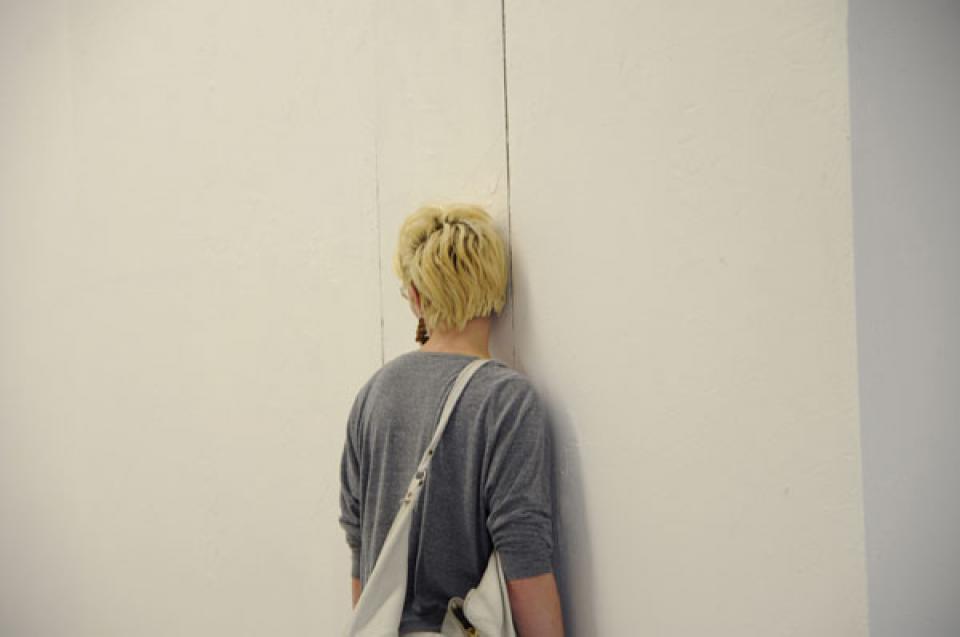
Spielraum 02, 2010
The basic idea of the work is the history of the Trojan horse in Homers Ilias. There is a hiding place in the form of a wall which forms a cavity. In this Trojan horse, here in the sense of positive infiltration and intervention in the existing system, you hide and come out at the time of the exhibition opening speech.
You have a blue top and a white plastic mask in front of your face. The mask stands for a picture of an unspoken future. You are wearing an mp3 player with loudspeaker, from which ironically spoken sentences can be heard during the opening speech.
You enter the exhibition rooms in front of the visitors and hide inside each of two large wooden buildings, each of which lies behind a wall of the exhibition room. There is light, air vents and a door that can only be opened from the outside. You can read, play, whisper or dream. It would be good to be quite quiet.
On a sign from me you put on the masks, turn on the mp3 player, leave your rooms and quietly enter the big hall in a row. While the opening speech is given there, you spread out in the room and stand on the markers I've put on for you before. You will stop for about 8 minutes. From your loudspeakers come the following sentences:
Schönheit bringt alles durcheinander. (Beauty confuses everything)
Das Neue bringt alles durcheinander. (The new confuses everything)
Kennen wir uns? (Do we know each other?)
Gefühle bringen alles durcheinander. (Feelings confuse everything)
Bewegung bringt alles durcheinander. (Movement confuses everything)
Helden bringen alles durcheinander. (Heroes confuse everything)
Wie heißt du? (What's your name?)
Then you go out the door together and to a pre-determined place. There you can put the mp3-players and change your clothes._____________________________________________
Doris Weinberger has long been engaged in research into text and meaning, text production, text and appearance, the publicity of texts, statements and the independence of thought. Essential for her works is the subversive infiltration of art, which at first is not tangible and yet aims at the participation of the audience (...) We watch, become part of a process, think with or remain outside. Doris Weinberger brings something on the way, into the public, but with it she releases her work from her control. It remains an open process, a calculated coincidence (...) It is a way of working that no longer shows the work of art, but the work process, the creation of the work. It is not the artistic artefact, an image, an artistic object, but rather we are part of the work process.
The artist initiates a communicative structure, she sees herself as an initiator for social, communicative processes with an open end on uncontrollable paths. She sets something in motion and lets it develop. Her work combines philosophy, interaction, communication and reflection.Marion Bertram
-
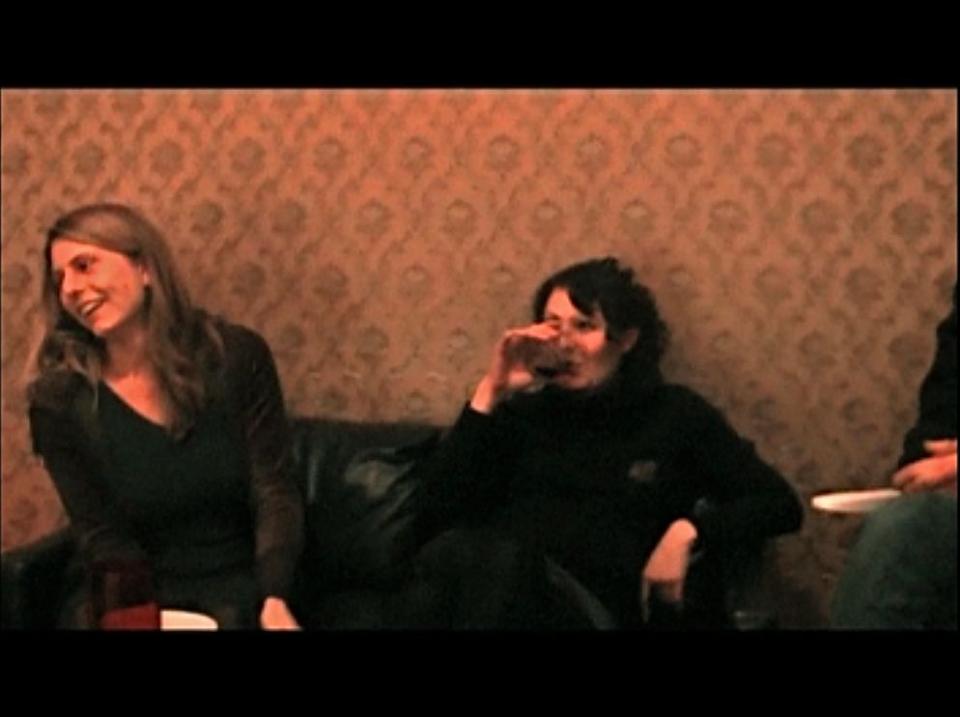
Der Künstler - ein Pausenclown? 02 , 2011
video still
-
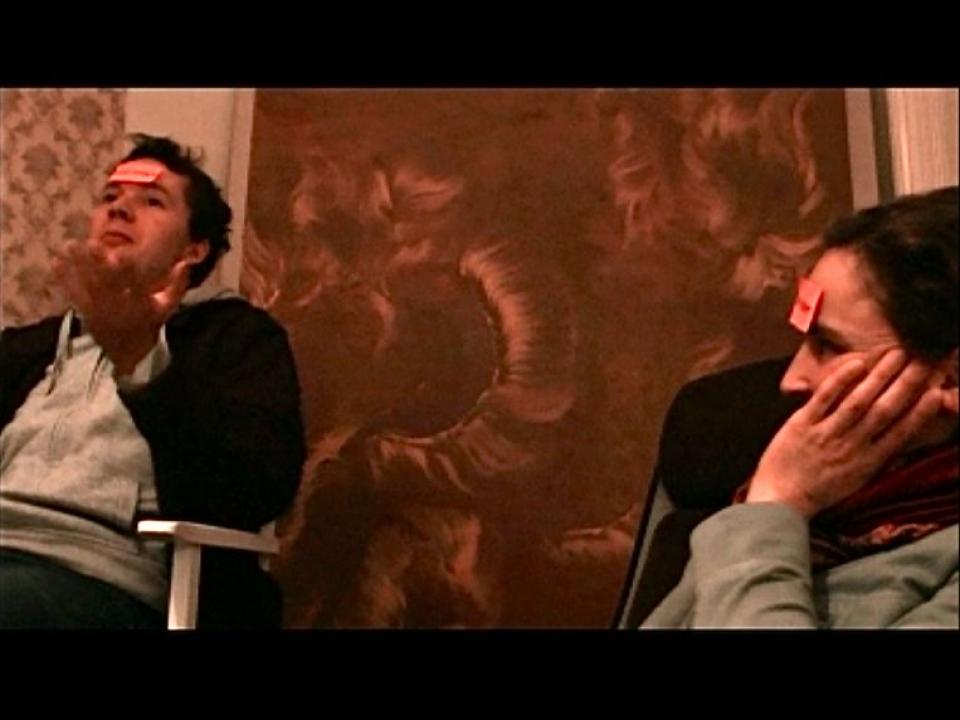
Der Künstler - ein Pausenclown? 03, 2011
video still
-

Der Künstler - ein Pausenclown? 04, 2011
The Artist - A Break Clown? A Game
Five artists and an art mediator who are still studying play a parlour game: The game Who am I? (also called a piece of paper in front of the head and a board in front of the head) is a guessing game in which the players embody a certain person (or animal, object, etc.) and try to find out who or what they represent through clever, deductive questions. It is often played at parties or other social gatherings. Pencils, notes and adhesive tape are needed. The number of participants, although actually not limited, should be at most 8 - 10 for reasons of the play fun, since otherwise the communication suffers. Each player writes a piece of paper with a known name (for example "Joseph Beuys", "Tracy Enim", "Miranda Jolie" etc.) and attaches it to the forehead of one of the other players, without the latter knowing the information. If everyone has such information, which is only visible to the other players, the game begins. One player now begins to ask the other questions about himself, which they answer with yes or no. The goal is to guess one's own identity as quickly as possible through deductive questions. If a question is answered with No, it is the next player's turn clockwise to ask questions to find out who he is.
3-channel video installation, 9:17 -
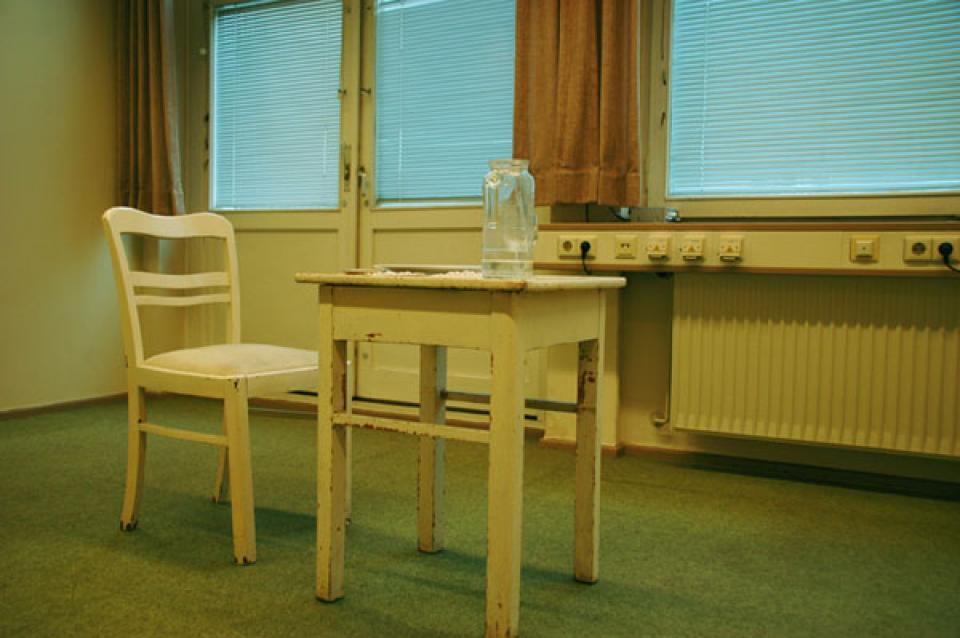
Stimmen zum Tod an Laya Condé, 2008
"Two dead. Two black dead. Two black skin dead in two German police cells. One, Laya Condé, died in Bremen in January 2004 when he was forcibly injected with an emetic. The other, Oury Jalloh, burned in January 2005 during the sobering in Dessau.
Both men were probably targeted by the police because they were black. Both were humiliated, ridiculed, tortured and killed. At both police stations racist comments and clichés were expressed (,black Africans turn up easily dead´), which certainly also influenced the behaviour of the doctors involved.
These days, two German judges pronounced their verdicts: Acquittal in Bremen, acquittal in Dessau.
In Germany, two men die in police custody, no one is criminally responsible, and that was it. The fatal signal sent out - it doesn't matter what happens to black suspects in German police cells - not only horrifies the black community here and in many other countries. It is, in principle, extremely disturbing."
Comment from Anke Schwarzer, in: Jungle World Nr. 50, 11. december 2008The work "Stimmen zum Tod an Laya Condé", which is based on these events, formulates the synchronicity of events and their levelling into everyday life in image and sound, standstill and action. Between real and fiction and in abstraction hides a hunch that opens a space for the incomprehensible.
During the trial visits to the reopening of the Laya Condé case in Bremen, we get to know his brother Namandjan and can persuade him to participate in our work and to transform it into an overall authentic, abstract form:
„Je suis Monsieur Namandjan Condé, le jeune frère de Laya Alama Condé, qui a été victime de l'arrestation de la police á Bremen en décembre 2004. Je suis venu avec ma maman comme assistants au procès de mon frère. Nous sommes lá pratiquement depuis presque deux mois et quelques. Maintenant il faut que j'explique á la population de Bremen en particulier et á la population de toute l'Allemagne en général les problèmes que j'ai depuis que je suis lá au procès de mon frère. Nous sommes restés en Guinée. L'État de Bremen nous a envoyé dix milles euros. Comme, en nous disant qu' ils ont donné ça á cause du choc moral que la maman a eut quand elle a apprit le décès de son enfant. On nous a envoyé par rapport á ça et moi entant que le jeune frère de mon frère qui est décédé, j'ai insisté, j'ai demandé á l'État de Bremen á ce que nous assistons au procès en Allemagne ici et venir aussi visiter le tombeau du frère parceque ça relève de notre culture.“
Namandjan Condé, who had applied for an admission permit for Germany and wanted to resume his studies of history, has meanwhile committed suicide.
4-channel audioinstallation, performance with Jule Körperich
Altes Finanzamt, Bremen, 2008
(documentation german/english/french) -

Stimmen zum Tod an Laya Condé, 2008
In: Raster und Fadenkreuz, S. 84-89
Andrea Sick, Katharina Hinsberg, Dorothea Mink (publishers)
Transcript Verlag Bielefeld 2009 -

Ein Künstler ist kein Keksriegel 02 / no title
-
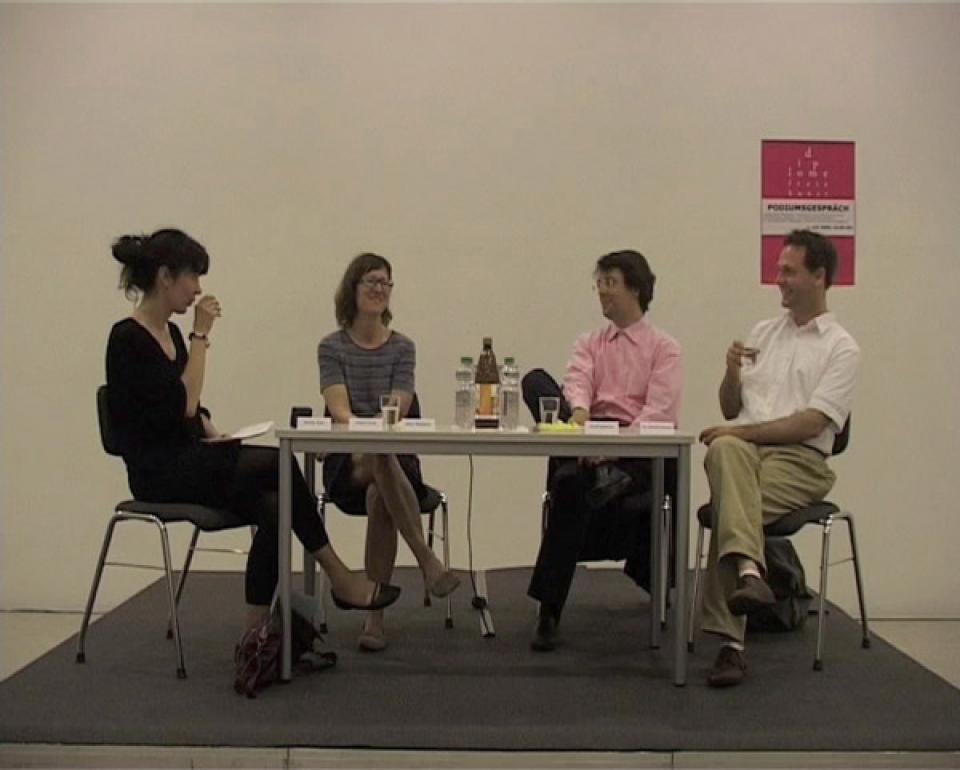
Ein Künstler ist kein Keksriegel 04 / no title
-

Ein Künstler ist kein Keksriegel 05 / no title
-
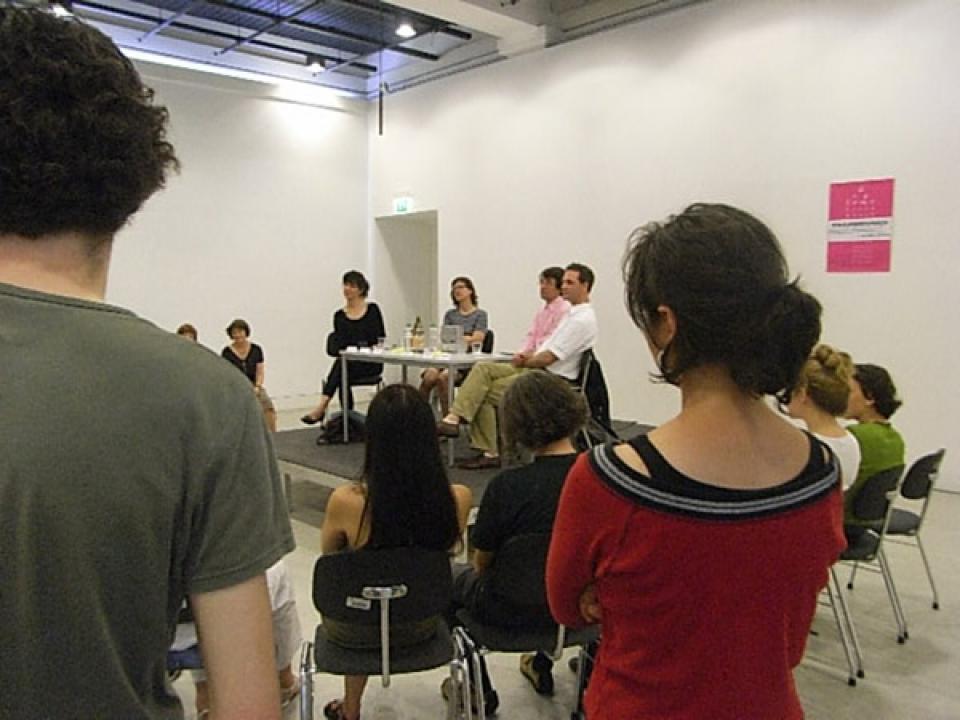
Ein Künstler ist kein Keksriegel 06 / no title
-

Bürger Spiel 02, 2010
installation, audio installation 6-channel
Galerie FLUT, Bremen - in cooperation with René Block, 2010
pilot projekt, Düsseldorf, 2010
STARTPOINT PRIZE 2010, Museum GASK, Kutna Hora (Czech Republic), 2010
(Documentation on DVD)
A local condition and fragments, individual moments in everyday life, are the framework.
The rules here are to expose oneself to the interlocking and shifting of assertions and truths, to lose oneself (oneself and something) in them, to shake hands with perception before the mind, to withdraw them again and to leave both standing.
The simple large room is characterized by an installed three-row horizontal pipe system, which apparently connects to the existing pipes in the lower area of the inner walls. The atmosphere is simple, maintaining distance.
The audio installation consists of three loudspeaker groups of three and two outputs each, integrated in the pipe system.
In the lower area you can hear from three loudspeakers how three people play "Mensch ärgere dich nicht". A fourth one sounds a calmly spoken text about the planning of revolutionary projects by means of explosives.
Between two diagonally mounted loudspeakers a short battle cry of riding knights unleashes every four minutes.
A pattern of sound and meaning emerges which cannot be grasped with logic. It hints, allows an inkling and only short thoughts and association moments. The individual subject areas are not necessarily linked with each other. Conflicts indicate each other, cause each other. The observing person fluctuates between security, harmony and rebellion, anger and the desire for new (action) possibilities. Between faith forms. Between everyday events and the special moment. Citizen game! Who makes the rules. -

Bürger Spiel 03, 2010
installation, 6-channel audio installation
Galerie FLUT, Bremen - in cooperation with René Block, 2010
A local condition and fragments, individual moments in everyday life, are the framework. The rules are the interlocking and shifting of assertions and truths, the exposure to them, the losing of oneself (oneself and something), the reaching out of the hand to the perception in front of the mind, the withdrawal of it and the leaving of both. Who makes the rules? You or me?
Doris Weinberger
(...) Doris Weinberger's exhibition is entitled "Bürger Spiel" ("Citizen Game") and, under this open title, opens a series of perceptual possibilities that grow richer the less they can be seen at first glance, because the actual axes of vision in which we can usually assume art are dramatically empty. Instead, the white of the White Cube shines unbroken and floodlit. Below or above these assumed lines of sight, however, pipe systems run in a straight line in a doubling of plastic-like grey inner water pipes and copper-plated pipes, as we know them from heating systems. Unplastered and obvious, they give the room a light construction site character, especially as the tube systems could well have practical functions. It is as if Doris Weinberger takes the now art-scientifically accepted concept of installation literally and returns it to its parallel meaning in plumbing. In its original Latin meaning, however, installare means "to put something in place", "to use it", but also "to enthrone it", thus fluctuating between profane or technical action and ritualized exaltation. In the field of art it is precisely the ready made, the ordinary object that can be represented by an installation and thus only becomes artistic, like these tubes, which behave quite appropriately in both the spatial and the artistic system, i.e. they do not occupy the space and do not appear particularly eccentric.
Instead they sound, at least the plastic parts at whose exits small loudspeakers are mounted, while the heating pipes imagine warmth without warming and thus touch the citizen in us in the "citizen game" quite accordingly. Because the citizen likes it to be a little homey. However, "Bürger Spiel" becomes really dramatic through the sound, which now plays its proper role in the minimalism of the room installation and also outshines the warmth. On one side of the installation there is a "Mensch ärgere dich nicht" - match whose sounds are alienated by jubilation and disappointment. On the other hand, a text is quietly read out, a guide to the production of explosives, written by a certain Johann Most at the end of the 19th century to encourage the intended arming of citizens. Here, then, is the private thrill of a bourgeois cube war, which has already temporarily driven some families into disarray, there is the public thrill of a possible bourgeois terror. These 17-minute loops are regularly interrupted by the noisy armies of crusaders, the first allies against the infidels of Islam, who point out that compared to today's terror it was the other way around. These acoustic crusaders in the edited sound of historical films are, so to speak, the first citizens and aristocrats to practise terror, and so when you listen to them for a long time, walk through the tubes and stroll around in space, the "citizen game" becomes a private, public and historical terror, which is ultimately our terror and could give us food for thought in our Taliban and Islamophobia and at the same time security fanaticism.
Even if today there is hardly any talk of the citizen, but rather of a so-called social centre of the so-called high performers, the bourgeoisie survives as a political and historical constant, which is articulated here in the pipe system. In its double of inner and outer heat, it becomes tangible, mediated by the aesthetic visibility of minimalism in the white cube, and even if we knew nothing of the foundations of sound, this concentrated event of exemplary visual and acoustic experience remains an open game in which we citizens participate in an emancipatory sense.
Michael Glasmeier